La Société canadienne de physiologie de l’exercice (SCPE) est formée de professionnels en physiologie de l’exercice, en biochimie, en condition physique et en santé. La SCPE est l’autorité reconnue au Canada lorsqu’il s’agit de traduire les avancées de la science de l’exercice en vue d’améliorer la santé, la condition physique et la performance des Canadiennes et Canadiens.
Parmi nos membres universitaires se trouvent d’éminents scientifiques de l’exercice de renommée mondiale. Le guide des membres universitaires ci-dessous met en lumière certaines recherches de nos membres universitaires de même que leurs conseils aux étudiantes et étudiants actuellement aux cycles supérieurs, et illustre leurs contributions à l’évolution des directives fondées sur des données probantes de la SCPE.
CSEP is always looking for innovative minds like the ones listed below to compliment our ever-evolving field. Join now, and be apart of this exciting community of scientists.
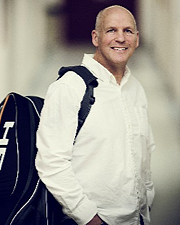 Dr. Behm’s research can be described as applied neuromuscular physiology and sport or exercise science. Studies include examining changes in muscule activation and muscle contractile properties with resistance training, stretching, balance, stability, fatigue and other related topics.
Dr. Behm’s research can be described as applied neuromuscular physiology and sport or exercise science. Studies include examining changes in muscule activation and muscle contractile properties with resistance training, stretching, balance, stability, fatigue and other related topics.
Faculty: Human Kinetics and Recreation- Memorial University of Newfoundland
Title: University Research Professor
CSEP member: since 1985
What do you wish you had known when you were in graduate school?
I wish I had better critiquing capabilities as a graduate student in order to better differentiate between poor, mediocre, and excellent research.
What information/ advice did you learn in graduate school that has been most influential?
The most important advice would have been to continually ask why? Much of my research has been generated when I walk into a gym or read and article about a new device or a new training regime and ask why might this work or why might it not work? Exercise scientists do not always lead the pack and many times, it is our responsibility to validate ideas that have originated from the public. Exercise fads and devices come and go and while some fads do not build upon or improve the existing procedures, some can and it is our job at times to distinguish between the wheat and the chaff.
Ce contenu est offert en anglais seulement.
Where do you think exercise physiology graduates are most needed?
Medicine needs more of a preventive medicine approach but medical doctors are not provided with enough exercise is medicine type information. There is only so much you can learn in four years. Exercise physiologists need to play abider role in rehabilitation as well as their present role in rehabilitation and fitness and conditioning.
Where do you see your overall area of research in the next 5 years?
I will continue to examine the neural mechanisms of fatigue as evidenced through non-local muscle fatigue effects as well as other responses. For example we have shown non-local stretching responses; that is stretch the upper body and the lower body gains an increase in range of motion and vice versa. We are just beginning to demonstrate non-local potentiation response with a conditioning exercise of one muscle causing performance potentiation in another distant muscle. We have also reported that treating one limb with massage reduces pain in another limb. These non-local effects may be very important for training and rehabilitation and understanding basic central nervous system mechanisms.
Outside of your own interests, what area of exercise science/ physiology do you find most exciting right now?
I am excited by all aspects of exercise physiology but of course my bias is foe muscle physiological effects and mechanisms.
Why is being a CSEP Academic Member important to you?
I feel a duty to contribute to my field within a Canadian context. I hope that my research in a small way benefits all Canadians from average individuals interested in health and fitness to elite athletes. The ability to meet and interact with other Canadian researchers with similar interests definitely benefits my research capabilities.
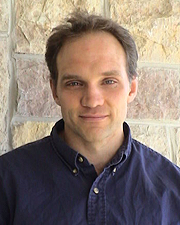 Dr. Chilibeck’s area of research involves the application of exercise and nutritional interventions to three main areas:
Dr. Chilibeck’s area of research involves the application of exercise and nutritional interventions to three main areas:
- Improving musculoskeletal health (ex. prevention of osteoporosis and sarcopenia)
- Improving metabolic health (ex. prevention of metabolic syndrome and diabetes)
- Improving strength or endurance performance
Faculty: College of Kinesiology- University of Saskatchewan
Title: Professor
CSEP member: since 1988
What do you wish you had known when you were in graduate school?
The importance of proper time-management strategies.
What information/ advice did you learn in graduate school that has been most influential?
- How to write more efficiently
- The importance of keeping up with reading of the scientific literature
- The importance of having good mentors
- How not owning a T.V. dramatically increases your productivity and improves your lifestyle.
Where do you think exercise physiology graduates are most needed?
I would like to see more of our exercise physiology graduates apply for graduate school; however, they are most likely needed in areas such as personal training, medicine, and physical therapy. Although the latter occupation may at times seem to be in competition with exercise physiologists, I think a Kinesiology degree or exercise physiology background can dramatically increase the quality of a physiotherapist.
Where do you see your overall area of research headed in the next 5 years?
Research on:
- The use of foods with low glycemic index for improving metabolic health and exercise performance.
- The use of novel nutritional supplements and exercise programs for improving musculoskeletal health.
Outside your own interests, what area of exercise science/ physiology do you find most exciting right now?
The importance of satellite cells; activation of signaling pathways to increase protein synthesis; deactivation of pathways to prevent protein degradation.
Why is being a CSEP Academic Member important to you?
As a CSEP academic member I think I have better opportunities to translate my research into useful information for CSEP-Certified exercise professionals (i.e. CSEP-CEPs, CSEP-CPTs), and other health-care practitioners.
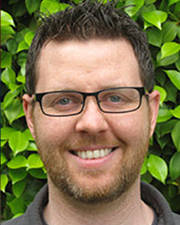 Dr. Mattar’s previous research involved neural control of blood vessels, particularly in hypertension.
Dr. Mattar’s previous research involved neural control of blood vessels, particularly in hypertension.
Faculty: Sport, Health and Physical Education- Vancouver Island University
Title: Professor
CSEP member: since 2006
What do you wish you had known when you were in graduate school?
Teaching is an amazingly rewarding activity.
What information/ advice did you learn in graduate school that has been most influential?
Writing and presenting with clear, simple language is critical for success in any discipline.
Where do you think exercise physiology graduates are most needed?
In knowledge translation. Getting the public informed of the necessity of healthy, active lifestyle.
Where do you see your overall area of research headed in the next 5 years?
Teaching is my mandate, but I do see developing an undergraduate research program focusing on exercise and cardiovascular health, to expose undergraduate students to the basic and primary research.
Outside your own interests, what area of exercise science/ physiology do you find most exciting right now?
I think that exercise adherence, and public education on the need for healthy lifestyles and physical activity are really important.
Why is being a CSEP Academic Member important to you?
Advocacy, and access to APNM.
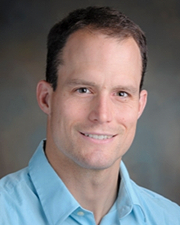 Dr. Clarke seeks to develop predictive models that enable the optimization of training programs to achieve health, fitness, performance or rehabilitation goals. His research draws upon tools and concepts from exercise physiology, biomedical engineering and systems biology.
Dr. Clarke seeks to develop predictive models that enable the optimization of training programs to achieve health, fitness, performance or rehabilitation goals. His research draws upon tools and concepts from exercise physiology, biomedical engineering and systems biology.
Faculty: Department of Biomedical Physiology and Kinesiology, Faculty of Science- Simon Fraser University
Title: Assistant Professor
CSEP member: since 2000
What do you wish you had known when you were in graduate school?
I wish I had known about the productivity-enhancing effects of caffeine consumption.
What information/ advice did you learn in graduate school that has been most influential?
Seek to answer the most important questions in your field.
Where do you think exercise physiology graduates are most needed?
Exercise physiology graduates are needed across the health and fitness industry, notably for helping those with chronic disease. Exercise physiologists should be a key part of healthcare teams.
Where do you see your overall area of research in the next 5 years?
I am working on projects involving the meta-analysis of published data, modeling of cellular signal transduction in response to exercise stressors, and in modeling data from wearable sensors. I seek to integrate these lines of inquiry as the years go by.
Outside of your own interests, what area of exercise science/ physiology do you find most exciting right now?
Exercise neuroscience – how does the CNS limit performance?
Why is being a CSEP Academic Member important to you?
CSEP offers a « home » for my research and my trainees. The connections with practitioners are also important for knowledge translation.
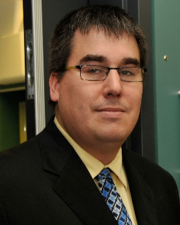 Dr. Duhamel’s research examines the influence of exercise for improving cardiovascular and metabolic health. Research includes basic exercise physiology and clinical applications of exercise for promoting health.
Dr. Duhamel’s research examines the influence of exercise for improving cardiovascular and metabolic health. Research includes basic exercise physiology and clinical applications of exercise for promoting health.
Faculty: Faculty of Kinesiology and Recreation Management- University of Manitoba
Title: Assistant Professor
CSEP member: since 2004
What do you wish you had known when you were in graduate school?
Grad students need to develop an awareness of what is happening on the national stage so they can learn from examples of best practice or success.
What information/ advice did you learn in graduate school that has been most influential?
Manage your time well, so you are prepared to move multiple projects forward at the same time. This skill will be critical as you move forward in your career.
Where do you think exercise physiology graduates are most needed?
Graduates with an understanding of exercise physiology have opportunities in health care, pharmaceutical companies and the technology sector. Biomedical technology is a rapidly developing sector that needs expertise from exercise physiologists.
Where do you see your overall area of research in the next 5 years?
My research will be focusing on strategies to de-frail an aging population. We need to more fully understand how exercise can slow or reverse the progression of frailty because it is a risk factor for poor health.
Outside of your own interests, what area of exercise science/ physiology do you find most exciting right now?
The emerging understanding of physical activity behavior and genetics is fascinating.
Why is being a CSEP Academic Member important to you?
CSEP is a strong organization because it is rooted in scientific knowledge and actively works to support the application of that knowledge in a variety of settings, such as sport and health.
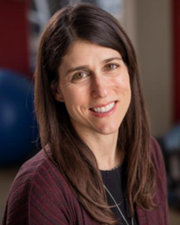 Dr. Giangregorio’s research team in the Bone Health and Exercise Science (BonES) lab studies how to reduce fracture risk and enhance mobility and physical activity participation in individuals with osteoporosis, or older adults in general. She conducts studies to understand how to better assess fracture risk or physical activity levels, and clinical trials of exercise or rehabilitation interventions. The BonES lab also develops, implements and evaluates strategies to get research into practice.
Dr. Giangregorio’s research team in the Bone Health and Exercise Science (BonES) lab studies how to reduce fracture risk and enhance mobility and physical activity participation in individuals with osteoporosis, or older adults in general. She conducts studies to understand how to better assess fracture risk or physical activity levels, and clinical trials of exercise or rehabilitation interventions. The BonES lab also develops, implements and evaluates strategies to get research into practice.
Faculty: Kinesiology- University of Waterloo
Title: Associate Professor
CSEP member: since 2000
What do you wish you had known when you were in graduate school?
How much I didn’t know (and still don’t).
What information/ advice did you learn in graduate school that has been most influential?
Ask an important research question, and answer it reliably (Salim Yusuf). It is easy to get distracted by studies that are interesting, or easy to do, but do not really move the field forward or address an important problem OR are not rigorous enough to truly answer the question. Sometimes, people collect data because they can, but not because they should. It is easy to try to answer too many questions with one study, and then compromise the study design such that you cannot reliably answer research questions that will change the way people think about a problem.
Where do you think exercise physiology graduates are most needed?
I think they are most needed in primary care, or environments focused on secondary prevention or rehabilitation (e.g., stroke rehab, fracture clinics) to work in partnership with physicians to ensure implementation of Canada’s Physical Activity Guidelines. However, they will have to lobby our government to fund such a role.
Where do you see your overall area of research headed in the next 5 years?
The answer to this question often depends on the interests of the trainees in the BonES lab, and what grants we secure. However, some of the areas we are working on include:
- Physical activity in individuals with vertebral fractures, including acute vertebral fractures.
- Understanding the interactions between weight loss, muscle atrophy or sarcopenia and fracture risk, and how we can intervene with nutrition or exercise or both.
- Effective implementation of exercise evidence e.g., exercise vital sign in primary care, knowledge translation interventions.
Why is being a CSEP Academic Member Important to you?
CSEP does a great job in fostering the translation of research to practice. I want to be a part of that, and learn from it.
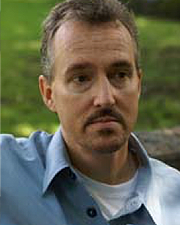 Dr. Harper investigates the health benefits of ketogenic nutrition
Dr. Harper investigates the health benefits of ketogenic nutrition
Faculty: Kinesiology (Health Services) – University of the Fraser Valley
Title: Associate Professor
CSEP member: since 2016
What do you wish you had known when you were in graduate school?
How to code.
What information/ advice did you learn in graduate school that has been most influential?
Critical reasoning and communication skills.
Where do you think exercise physiology graduates are most needed?
Chronic disease and aging.
Where do you see your overall area of research headed in the next years?
Proving that ketogenic diets can prevent and treat most chronic disease, safely and without medication.
Outside of you own interests, what are of exercise science/physiology do you find most exciting right now?
Neurophysiology.
Why is being a CSEP Academic Member important to you?
Professional networking, communicating my research, and helping and inspiring younger academics.
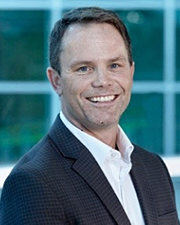 Muscle is critical for our physical capacities and whole-body metabolism. Do changes that happen to muscle in diseases, like diabetes, impact the severity of the disease and the complications that develop? Dr. Hawke’s lab is answering questions like these.
Muscle is critical for our physical capacities and whole-body metabolism. Do changes that happen to muscle in diseases, like diabetes, impact the severity of the disease and the complications that develop? Dr. Hawke’s lab is answering questions like these.
Faculty: Pathology and Molecular Medicine- McMaster University
Title: Associate Professor
CSEP member: since 2004
What do you wish you had known when you were in graduate school?
Be patient and work thoughtfully. Get more collaborations going! Science is not a one-man show!
What information/ advice did you learn in graduate school that has been most influential?
Don’t worry about everyone else. Being jealous of others accomplishments is distracting and unproductive. Set your sights and work towards them. Worrying what other people are doing could cause you to lose focus on what you want to achieve or how you planned to get there.
Where do you think exercise physiology graduates are most needed?
Everywhere- Exercise is the pill that restores health. Understanding how the body responds to exercise provides huge therapeutic insight- whether it be working in rehab, a gym, a lab, big pharma, or a little startup- you have a background of knowledge many do not.
Where do you see your overall area of research headed in the next 5 years?
With our collaborators, my grad students and I will be laying the ground work for new evidence-based physical activity guidelines for those with T1DM.
Outside of your own interests, what areas of exercise science/physiology do you find most exciting right now?
Exosome biology- how cells communicate by vesicles is fascinating.
Why is being a CSEP Academic Member important to you?
Translating our basic sciences to practice is important to me.
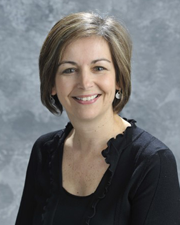 Dr. Hicks studies the physiological and health-related benefits of physical activity in populations with neurological impairment (ex. spinal cord injury, multiple sclerosis). She is also interested in the development and application of physical activity guidelines.
Dr. Hicks studies the physiological and health-related benefits of physical activity in populations with neurological impairment (ex. spinal cord injury, multiple sclerosis). She is also interested in the development and application of physical activity guidelines.
Faculty: Science- McMaster University
Title: Professor
CSEP member: since 1982
What do you wish you had known when you were in graduate school?
That the ‘story’ is not over when we complete our research study. Research always prompts further questions.
What information/ advice did you learn in graduate school that has been most influential?
To learn how to accept criticism from your mentors and peers is a fundamental part of being a scientist. The first manuscript rejection is the toughest … it gets easier after that.
Why is being a CSEP Academic Member important to you?
Belonging to an academic society like CSEP keeps you connected with your colleagues, and with CSEP in particular we can see the application of scientific discovery to professional practice. Our journal is fantastic, and our annual conferences are a wonderful opportunity to connect with graduate students and colleagues from across Canada (and the world).
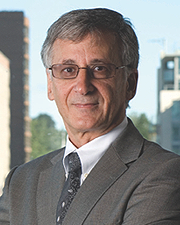 Dr. Jacobs research has been an eclectic mix of applications of exercise physiology to understanding human performance and survival capabilities and limitations, and the development of strategies to counteract limitations.
Dr. Jacobs research has been an eclectic mix of applications of exercise physiology to understanding human performance and survival capabilities and limitations, and the development of strategies to counteract limitations.
Faculty: Kinesiology and Physical Education- University of Toronto
Title: Professor and Dean
CSEP member: since 1985
What do you wish you had known when you were in graduate school?
The range of opportunities to pursue exercise physiology research as a professional career, in addition to those in academia.
What information/ advice did you learn in graduate school that has been most influential?
How to communicate scientifically and how to adjust that communication for different audiences who may be specialists or laypeople. Get out of your comfort zone and, for example, move to study in another country.
Where do you think exercise physiology graduates are most needed?
Integrated health provider teams, government policy and program development (federal, provincial and municipal, high performance sports.
Where do you see your overall area of research headed in the next 5 years?
I am currently engaged in research to understand the effects of exercise on the pharmacokinetics of commonly prescribed drugs.
Outside of your own interests, what area of exercise science/physiology do you find most exciting right now?
Immunology.
Why is being a CSEP Academic Member important to you?
In recent decades, Canada has always been at the international forefront of exercise physiology research. The collaborative networking opportunities in Canada are rich and fertile ground for progress, and our annual CSEP conference is a fantastic opportunity for continuing professional development and knowledge transfer.
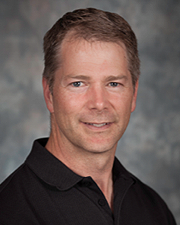 It has been known for a number of years that the nervous system and the neuromuscular system adapt and change to changes in activity patterns. This basic understanding has not been widely tested in cases of neurologic or neuromusuclar impairments. We study a neurodegenerative condition called amyotrophic lateral sclerosis (ALS) and how exercise or sedentary behaviour impacts the progression of this disease.
It has been known for a number of years that the nervous system and the neuromuscular system adapt and change to changes in activity patterns. This basic understanding has not been widely tested in cases of neurologic or neuromusuclar impairments. We study a neurodegenerative condition called amyotrophic lateral sclerosis (ALS) and how exercise or sedentary behaviour impacts the progression of this disease.
Faculty: Physical Education and Recreation- University of Alberta
Title: Associate Professor
CSEP member: since 2013
What do you wish you had known when you were in graduate school?
I wish I knew who Benjamin Zander was and his take on giving students an A and the Art of Possibility.
What information/ advice did you learn in graduate school that has been most influential?
Integrity: this was the most important lesson I learned from my supervisors. Bias is a natural part of the human condition; blind yourself and let the measurements speak for themselves.
Where do you think exercise physiology graduates are most needed?
We need people with the confidence to work with individuals living with chronic neurologic and neuromuscular conditions.
Where do you see your overall area of research headed in the next 5 years?
Exercise for people living with ALS (and other neurologic impairments) is a field with many « well-intentioned » opinions that need empirical testing. We need to catch up to our colleagues in cardiovascular and metabolic disease.
Outside your own interests, what area of exercise science/ physiology do you find most exciting right now?
I can’t seem to get enough of Martin Gibala and HIIT. Chris Hadfield also reawakened my long-standing interest in exercise physiology in altered gravity environments.
Why is being a CSEP Academic Member important to you?
This is a very supportive community that delivers tangible information/services/etc., to a broad range of stakeholders, based on solid research. Contributing to this noble enterprise is an honor.
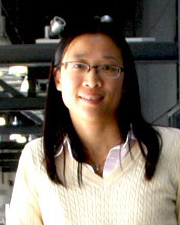 Currently, Kuk’s laboratory is investigating the relationship between obesity and health through clinical human studies and epidemiological approaches. In particular, she is interested in understanding why some individuals with obesity maintain a healthy profile, while others develop disease. Further, she is currently working on factors that identify successful weight management in adult and pediatric bariatric patient populations.
Currently, Kuk’s laboratory is investigating the relationship between obesity and health through clinical human studies and epidemiological approaches. In particular, she is interested in understanding why some individuals with obesity maintain a healthy profile, while others develop disease. Further, she is currently working on factors that identify successful weight management in adult and pediatric bariatric patient populations.
Faculty: Health- York University
Title: Associate Professor
CSEP member: since 2001
What do you wish you had known when you were in graduate school?
I wish I had known when I started my faculty position that my colleagues and the university staff would be so willing to help me, and I wish I had asked for help earlier.
What information/ advice did you learn in graduate school that has been most influential?
The reason we do research is because we don’t know the answer. We need to be open to the fact that our hypothesis may be wrong and that we learn more from when we are wrong then when we are right.
Where do you think exercise physiology graduates are most needed?
Primary care clinics.
Where do you see your overall area of research headed in the next 5 years?
I think we need to emphasize the importance of lifestyle behaviours and take the focus off weight loss and obesity. Research has shown that in our environment, weight loss is not sustained and there are several factors that go beyond diet and exercise that dictate body weight. Development of therapies beyond diet and exercise that actually result in long term weight loss is needed.
Outside your own interests, what area of exercise science/ physiology do you find most exciting right now?
I want to know why some individuals with obesity manage to stay metabolically healthy while most develop disease.
Why is being a CSEP Academic Member important to you?
Canadian researchers are world leaders and being part of CSEP gives me an opportunity to continue to learn
 Dr. Notarius’ research has focused on how neurogentic vasoconstriction contributes to exercise intolerance in patients with heart failure. This stemmed from the novel detection of an inverse relationship between VO2peak and muscule sympathetic nerve activity (MSNA) at rest and an augmented muscle metaboreflex MSNA to handgrip in patients with the lowest VO2peak. By acquiring MSNA signals from the opposite limb during 1-legged cycling, she found that MSNA rose in HF patients but fell in matched controls. Peak MSNA during exercise correlated inversely with VO2peak. She is now studying autonomic reflex abnormalities in HF and if targeted exercise training can reverse these.
Dr. Notarius’ research has focused on how neurogentic vasoconstriction contributes to exercise intolerance in patients with heart failure. This stemmed from the novel detection of an inverse relationship between VO2peak and muscule sympathetic nerve activity (MSNA) at rest and an augmented muscle metaboreflex MSNA to handgrip in patients with the lowest VO2peak. By acquiring MSNA signals from the opposite limb during 1-legged cycling, she found that MSNA rose in HF patients but fell in matched controls. Peak MSNA during exercise correlated inversely with VO2peak. She is now studying autonomic reflex abnormalities in HF and if targeted exercise training can reverse these.
Faculty: Medicine, Adjunct in Kinesiology- University of Toronto
Title: Scientific Associate III
CSEP member: since 1980
What do you wish you had known when you were in graduate school?
When an MSc student I wish I had appeciated that a PhD was necessary if one wants to works in research in a hospital environment. I started a PhD 7 years later but in between gained valuable clinical skills and experience working with patients in cardiac rehabilitation.
What information/ advice did you learn in graduate school that has been most influential?
How to write papers and present findings clearly. Both my MsC and PhD supervisors provided lots of editing and feedback. Practical skills obtained by required professional certifications were also an asset.
Where do you think exercise physiology graduates are most needed?
They are needed both in the clinical arena as well as in research. Both support health promotion which is the overall goal.
Where do you see your overall area of research headed in the next 5 years?
Hopefully the outcome of my work will lead to targeted individualized exercise therapies for heart failure patients and contribute to the evidence base for exercise rehabilitation leading to increased referral rates.
Outside your own interests, what area of exercise science/ physiology do you find most exciting right now?
The work in our lab linking activation of brain regions with clinical markers of functional outcome in cardiac patients with sleep disturbances.
Why is being a CSEP Academic Member important to you?
I enjoy the link with those involved in exercise science research in Canada from whom I learn a great deal.
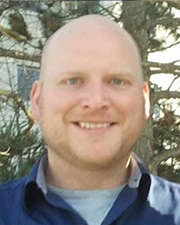 Dr. Perry is a researcher of movement disorders and the metabolic basis of muscle fitness. Translating mitochondrial bioenergetics and redox biology to health and disease. Focus on metabolic basis of muscle weakness disorders such as muscular dystrophy and chemotherapy-induced cachexia.
Dr. Perry is a researcher of movement disorders and the metabolic basis of muscle fitness. Translating mitochondrial bioenergetics and redox biology to health and disease. Focus on metabolic basis of muscle weakness disorders such as muscular dystrophy and chemotherapy-induced cachexia.
Faculty: Health- York University
Title: Associate Professor
CSEP member: since 2007
What do you wish you had known when you were in graduate school?
My PhD focused on the regulation of muscle metabolism as a determinant of fitness in humans. I eventually realized that my skills in cell metabolism could be applied to any disease in any tissue. I think students in any field related to cellular physiology should realize they have skills that can allow them to move into a broad range of fields. Students need to realize the potential utility of their skills beyond the field they work in – there is broad opportunity to define yourself as a researcher down the road…both in your field, or in a new direction.
Also, students should be told early in their training that it is entirely possible to have a therapy-driven outcome to their research in addition to important basic scientific investigation.
What information/ advice did you learn in graduate school that has been most influential?
Graduate school is not a 9-5 job. If you want to be competitive down the road, you need to make it your life (with some balance, of course). With this in mind, you must choose a graduate program and thesis topic that you are passionate about. This ensures that it becomes your hobby.
Where do you think exercise physiology graduates are most needed?
- We already know exercise prevents and treats diabetes, obesity and cardiovascular conditions. What we need now are exercise physiology students focusing on behaviour change: HOW do you make people choose to exercise and adopt a healthy lifestyle. This has little to do with cellular physiology and much to do with a broad range of motivational and policy topics.
- From a basic science view, I suggest to examples to think about (but there are others). Exercise physiology students have the opportunity to study a) mechanisms of how sedentarism accelerates other aging-related diseases such as neurological disorders and cancer, and b) apply your expertise to diseases that result in exercise limitations, as occurs in cancer patients, respiratory disorders (COPD), a variety of neuromuscular conditions, etc. These conditions prevent people from exercising. Thus, we need therapies that improve muscle function to the point where afflicted individuals can then engage in exercise.
In short: if you are interested in exercise-treatable diseases, focus on how to make people choose to exercise (become a behaviourist), OR consider a direction that focused on integrating basic science with developing therapies to treat conditions that prevent people from exercising (or moving!).
Whatever you choose, I suggest focusing your research towards a goal of actually helping society. Become an integrative and translational researcher: couple mechanisms to therapy. You may actually be part of a real solution for real problems one day.
Where do you see your overall area of research headed in the next 5 years?
Therapy-driven outcomes focused on preventing muscle weakness in a variety of neuromuscular disorders that otherwise prevent people from exercising (let alone moving!).
Outside your own interests, what area of exercise science/ physiology do you find most exciting right now?
The utility of exercise as a therapy to prevent and treat neurological diseases and cancer is exciting and beyond the traditional view of exercise as medicine for cardiovascular and metabolic disorders (although they are all related). The future will identify even more diseases and conditions that are influenced by lifestyle.
Why is being a CSEP Academic Member important to you?
CSEP is one of Canada’s best mechanisms for academics to teach the public that exercise is, in fact, medicine. Each CSEP member needs to think about public outreach and knowledge translation – from student to faculty and everyone in between in the academic membership. Academic members should inquire on CSEP’s recent initiative of ‘Exercise is Medicine Canada’. This program is in development and will be an exciting avenue for members to promote exercise awareness – and hopefully practice – throughout Canada.
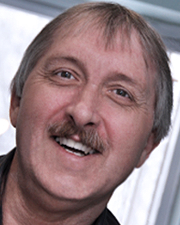 Mr. Plyley’s research is aimed at developing a better understanding (a) of how the geometrical arrangement of the capillaries and muscle fibers impacts the supply of oxygen and nutrients to, and the removal of waste byproducts from, skeletal muscle in health (including training and detraining) and disease, and (b) the etiology of angiogensis in skeletal muscle, and its relationship to various fiber attributes, such as fibre size (area, perimeter, surface area, shape), satellite cell activity and positioning, mitochrondrial supply and location, and trans-sarcolemmal transport mechanisms and sites.
Mr. Plyley’s research is aimed at developing a better understanding (a) of how the geometrical arrangement of the capillaries and muscle fibers impacts the supply of oxygen and nutrients to, and the removal of waste byproducts from, skeletal muscle in health (including training and detraining) and disease, and (b) the etiology of angiogensis in skeletal muscle, and its relationship to various fiber attributes, such as fibre size (area, perimeter, surface area, shape), satellite cell activity and positioning, mitochrondrial supply and location, and trans-sarcolemmal transport mechanisms and sites.
Faculty: Applied Health Sciences- Brock University
Title: Professor
CSEP member: since 1978
What do you wish you had known when you were in graduate school?
- How useful the other faculty members on my Advisory Committee could be, so that I could have taken advantage of their respective backgrounds, expertise, and experience.
- What opportunities existed within the Department, the Faculty, and across the University for me to gain knowledge and experience beyond conducting research and writing grants and papers.
- How knowledgeable and useful the Librarians are in terms of literature research, use of copy-written material, and presentation of organized materials.
What information/ advice did you learn in graduate school that has been most influential?
- The critical role that patience has in research;
- Appreciating the usefulness and potential strength of graphical analysis in revealing physiological and anatomical connections and integrated responses;
- Understanding the meaning and efficacy of using mathematical analysis and curve fitting to ascertain relationships between variables – beyond simple linear regression;
- The importance of taking criticism – in any form, to improve one’s thinking, writing, and overall development; this is an area that many students, and faculty, fail to use to help their development as they rail against the individuals and/or the manner by which the criticism was delivered rather than taking advantage of, and benefiting from, what is being conveyed.
Where do you think exercise physiology graduates are most needed?
The training that graduate students get within their degree programs, and the opportunities that now exist to develop and hone various “professional” skills and competencies, provide students with all the tools to be successful in many areas of society, whether that be in academic areas, business, government, or becoming an entrepreneur.
Where do you see your overall area of research headed in the next 5 years?
This is an exciting time in the area of investigating the function, role, and adaptive responses of the capillary network. There was a lull in this area of research for about 15 years prior to 2000, but as our understanding of the integration of various systems has developed, along with the efficacy of the tools provided through the use of antibodies and computerized image analysis, there has been a resurgence in the area as individuals from any number of disciplines have turned to exploring the microcirculation and its critical importance to bodily function.
Why is being a CSEP Academic Member important to you?
CSEP (formally CASS) has been critical to me in a number of ways.
It has provided me and my students with a forum in which to interact with colleagues concerning our research, to learn from them about new developments in our various fields, and to exchange research ideas based on their latest findings.
The CSEP Annual Meeting has provided a setting for me to discuss opportunities that exist for research collaboration, laboratory interactions and visits, and potential grants, and has furnished opportunities to discuss with prospective students from across Canada about our research and the potential of joining the lab. Similarly, I have been able to discuss face to face future research collaborations, laboratory interactions and relationships with my colleagues.
CSEP, through its Annual Meeting and its journal, has provided me and my students with opportunities to disseminate our research, for my graduate students to present their work in a supportive atmosphere, to hear from their peers about their work and ideas, and for them to become knowledgeable about what who is who, opportunities that exist, and to interact with other graduate students.
For all of us in the field, CSEP has afforded those of us involved in research and university teaching opportunities to interact, to publish and communicate our research, and to build consensus and positions papers based on our research and experience; for our students and colleagues involved in the fitness and clinical areas of the field, CSEP has provided opportunities for them to develop further their knowledge and skills, and for all of us, CSEP presented opportunities to talk about our field, to explore issues that involve all of us, and to mobilize collectively to provide research and practical support to the Canadian public.
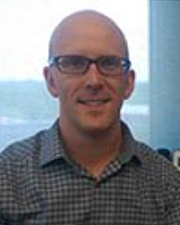 Dr. Robertson examines the relationship between cardiovascular and brain health. Specifically, he examines the impact of aerobic-based training on cerebral hemodynamics during the recovery from a stroke. He uses a combination of MRI, ultrasound and continuous blood pressure monitoring to obtain a comprehensive assessment of vascular health.
Dr. Robertson examines the relationship between cardiovascular and brain health. Specifically, he examines the impact of aerobic-based training on cerebral hemodynamics during the recovery from a stroke. He uses a combination of MRI, ultrasound and continuous blood pressure monitoring to obtain a comprehensive assessment of vascular health.
Faculty: Sunnybrook Research Institute- University of Toronto
Title: Postdoctoral Fellow
CSEP member: since 2005
What do you wish you had known when you were in graduate school?
I would have benefited from a stronger coding background for data modeling and analysis during graduate school.
What information/ advice did you learn in graduate school that has been most influential?
Being able to distill the importance of your research into brief sound bites. Being able to quickly describe the aims, methods, and impact of my research has been beneficial in developing a network of clinical collaborators.
Where do you think exercise physiology graduates are most needed?
Multi-disciplinary medical clinics.
Where do you see your overall area of research headed in the next 5 years?
Examining how aerobic fitness mediates the relationship between physiological stressors and brain health in older adults.
Outside your own interests, what area of exercise science/ physiology do you find most exciting right now?
The development of wearable technology is very exciting. As reliability of these devices increases, I hope their utility will prove to be an important tool for widespread adoption of exercise prescription (e.g. cardiac rehabilitation in remote populations).
Why is being a CSEP Academic Member important to you?
Helps to keep me up to date on advances in physiology within Canada outside of my specialty. Offers a knowledge translation avenue for promoting physical activity to Canadians.
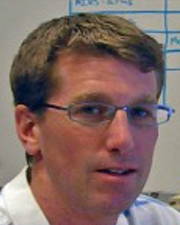 The long-term objective of Dr. Sheel’s research program is to understand how the human respiratory and cardiovascular systems interact, respond and adapt to physiologically relevant stressors such as exercise and hypoxia. Recent work has been focused on male-female differences with respect to pulmonary mechanics.
The long-term objective of Dr. Sheel’s research program is to understand how the human respiratory and cardiovascular systems interact, respond and adapt to physiologically relevant stressors such as exercise and hypoxia. Recent work has been focused on male-female differences with respect to pulmonary mechanics.
Faculty: Kinesiology- University of British Columbia
Title: Professor
CSEP member: since 1994
What do you wish you had known when you were in graduate school?
Be less worried about making mistakes and being wrong.
What information/ advice did you learn in graduate school that has been most influential?
Ask your research question first. Worry about methods and logistics later.
Where do you think exercise physiology graduates are most needed?
Having people who are educated with respect to ‘exercise’ is important in many fields ranging from basic science to medicine to health promotion.
Where do you see your overall area of research headed in the next 5 years?
The area of exercise metabolism and nutrition is an area I find interesting but know little about.
Why is being a CSEP Academic Member important to you?
The CSEP organization is an important advocate for exercise and having a national ‘voice’ is something I strongly support.
